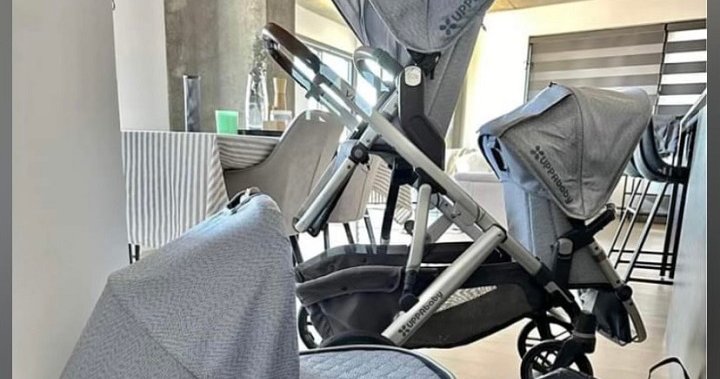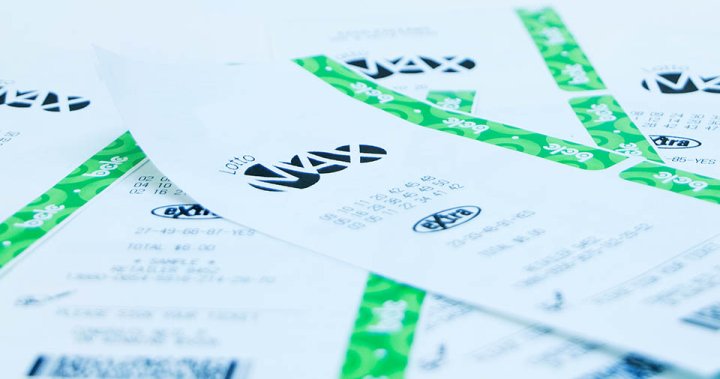Vincent Montambeault is a first-time dad to a now-four-month-old boy.
And while parenthood holds many surprises, he says getting scammed while trying to buy baby gear wasn’t something he was expecting.
“I think we just have that bubble in our head that everyone’s in the same boat as us,” he said. “Everyone is kind and wants the best for the parents.”
Montembeault and his girlfriend live in Sherbrooke, but they decided to drive the roughly 155 kilometres to Montreal after finding the perfect stroller — an Uppababy Vista 1 — online.
“The ad had these pictures of a pretty much a brand-new stroller. It was fully equipped,” he said of the Facebook Marketplace ad.
So with an asking price of $890, the couple felt like it was a fair deal.
Once they arrived in the city and contacted the seller, they were made to wait outside the building.
“She brought the stroller and then she kind of rushed us, saying that, ‘Yeah, I don’t have much time,’” Montembeault said.
So he pushed it around quickly and packed it into the car.
He was going to pay cash and had withdrawn $880 but the seller refused and asked for an e-transfer for the remaining $10.
It was only when all was said and done that the couple realized they didn’t get what had been advertised.
Although the stroller works, Montembeault says it’s very worn and worth “easily half the price” they paid for it.
When he tried to reach the seller, the message was never read. He believes he was most likely blocked.
Montembeault admits he did not do his due diligence.
He says he should have taken the time to inspect the stroller properly and had the photos from the ad on hand to compare them.
Montembeault decided to speak out about his experience after seeing a complaint online about stroller ads and realizing it was about the seller he says had scammed him.
The warning was written by Emma Austin.
The email you need for the day’s
top news stories from Canada and around the world.
Like Montambeault, Austin saw an ad for an Uppababy stroller that was “basically brand new,” she said.
She messaged the seller and Austin’s husband went to pick it up last week.
“He asked the seller: ‘Is there anything wrong with it?’ and she said no,” Austin recalled. “It had been advertised like new, so we took her word for it.”
Turns out, there were a few issues with it, including rusty parts that wouldn’t come off, like a wheel that was “so seized up it wouldn’t run properly.”
Rips and glue are seen in the stroller that Emma Austin bought online. It was advertised as near new.
Emma Austin
She messaged the seller by email, explaining all the problems she’d discovered, asking for some of her money back.
The seller, Austin said, responded that the sale was made in good faith and that would be the end of the conversation.
“Then I started looking at Facebook a little bit more closely. I realized that she had blocked me immediately after the sale,” Austin said, meaning she was unable to write a review.
Also while digging around, she realized the seller had several strollers for sale.
That’s when Austin decided to write her own ad, describing her experience.
“And I started getting this flood of messages of, ‘Oh yeah, I bought a stroller from her and the same thing happened. Really bad condition or advertised like new,’” she said.
“Or I got messages also saying, ‘Yeah, she bought a stroller from me and the next day was … reselling it for three times the price she bought it from me from.’”
Sylvie de Bellefeuille, a lawyer with Option Consommateurs — a non-profit association whose mission is to help consumers and defend their rights — said for online ads by a personal seller, it’s often a case of buyer beware.
“When it comes from buying from an online profile, anybody can create a profile create a Gmail or Hotmail address and disappear right after,” she said.
“If something goes wrong, there’s no way to find that other person and you will end up losing money.”
De Bellefeuille says that in person-to-person transactions, the seller has the obligation to sell something that works or that is as described.
The buyer, she said, has general recourses under the Civil Code, including sending a letter of default and even going to small claims court.
“Now, the problem, most of the time, is in those kind of transactions, we don’t have a full name. We usually don’t have an address,” she said.
The ideal situation would be to have proof of purchase, even if it’s just a note with the seller’s name and how much you paid.
Ultimately, though, without an address or a working email, de Bellefeuille says it will be like trying to “chase a ghost.”
Austin considered small claims court but a lawyer advised against it — that maybe for $1,000 it wasn’t worth Austin’s time or energy.
“Being pregnant, I have a lot of other things on my mind. So I don’t really want to put myself through the stress of that,” she said.
Person-to-person transactions often rely on good faith so you have to be careful, de Bellefeuille said, adding the higher the value the higher the risk.
Make sure you’re dealing with a real person, and the item really works and is in good shape, she advised.
Those are Austin’s and Montambeault’s takeaways as well.
“I just want to warn people,” Austin said.
“This was our first time buying a stroller, and you don’t really expect people to take advantage of you when you’re buying baby things.”
Her advice is for parents to do their research.
“If we were buying a stroller or something else secondhand, we would Google the brand, make sure to look for what kind of damage it might have, and we would really inspect it before making the purchase,” she said. “So we’ve learned our lesson.”
— With files from Global News’ Phil Carpenter





